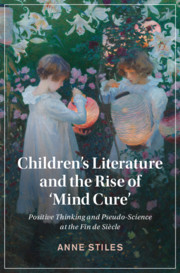 Children's Literature and the Rise of ‘Mind Cure'
Children's Literature and the Rise of ‘Mind Cure' Book contents
- Children’s Literature and the Rise of “Mind Cure”
- Cambridge Studies in Nineteenth-Century Literature and Culture
- Children’s Literature and the Rise of “Mind Cure”
- Copyright page
- Dedication
- Contents
- Illustrations
- Acknowledgments
- Introduction
- Chapter 1 The Inner Child in Frances Hodgson Burnett’s Little Lord Fauntleroy and Sara Crewe
- Chapter 2 Fauntleroy’s Ghost
- Chapter 3 Rewriting the Rest Cure in Frances Hodgson Burnett’s The Secret Garden
- Chapter 4 Sunshine and Shadow
- Chapter 5 New Women, New Thoughts
- Epilogue
- Notes
- Bibliography
- Index
- Cambridge Studies in Nineteenth-Century Literature and Culture
Chapter 1 - The Inner Child in Frances Hodgson Burnett’s Little Lord Fauntleroy and Sara Crewe
Published online by Cambridge University Press: 10 December 2020
- Children’s Literature and the Rise of “Mind Cure”
- Cambridge Studies in Nineteenth-Century Literature and Culture
- Children’s Literature and the Rise of “Mind Cure”
- Copyright page
- Dedication
- Contents
- Illustrations
- Acknowledgments
- Introduction
- Chapter 1 The Inner Child in Frances Hodgson Burnett’s Little Lord Fauntleroy and Sara Crewe
- Chapter 2 Fauntleroy’s Ghost
- Chapter 3 Rewriting the Rest Cure in Frances Hodgson Burnett’s The Secret Garden
- Chapter 4 Sunshine and Shadow
- Chapter 5 New Women, New Thoughts
- Epilogue
- Notes
- Bibliography
- Index
- Cambridge Studies in Nineteenth-Century Literature and Culture
Summary
In twenty-first-century psychology and self-help literature, the “inner child” refers to an original or true self that serves as a repository of wisdom for its adult counterpart. This chapter traces the modern inner child back to Christian Science founder Mary Baker Eddy and her protégée Emma Curtis Hopkins, the leading New Thought teacher of the 1880s and 1890s. Hopkins described an idealized “Man Child” within each adult woman who could lead her to spiritual serenity and worldly success. Frances Hodgson Burnett fictionalized different versions of this figure in her short story Sara Crewe (1888) and her blockbuster novel Little Lord Fauntleroy (1886), whose eponymous child hero helps his mother achieve undreamed-of wealth and status. Little Lord Fauntleroy also serves as his mother’s proxy outside of the domestic sphere, allowing her to reach personal goals without appearing inappropriately ambitious. The novel’s enormous popularity may have stemmed from this symbiotic relationship between mother and son. Then as now, the inner child helped women reconcile social pressures to be selfless and giving with career pursuits and self-indulgent behavior. The persistence of the inner child suggests that contemporary feminism still has work to do in enabling women to embrace opportunities without guilt.
Keywords
- Type
- Chapter
- Information
- Children's Literature and the Rise of ‘Mind Cure'Positive Thinking and Pseudo-Science at the Fin de Siècle, pp. 24 - 53Publisher: Cambridge University PressPrint publication year: 2020


